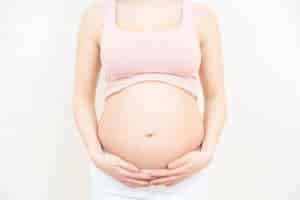Easy ways to increase the chances of getting pregnant for the first time

So you have finally made the decision to have a baby and are wondering how to increase your chances of getting pregnant.
Great!
Now where to start?
The ability to increase your chances of getting pregnant fast has a lot of different contributing factors, some you can and some you can’t control. For me, I had to have intervention (IVF) to increase my chance of getting pregnant.
For you, there could be other reasons (that I will talk about later in this post), but don’t despair if you don’t get pregnant right away. For many couples, it can take more than a few weeks or months to conceive.
For this post, I wanted to review the factors that are in your control and how you can use them to your advantage.
From foods to the environment, there is a lot that you can do to increase your chances of pregnancy with some simple lifestyle changes and a bit of determination.
How to Naturally Increase Chances of Getting Pregnant
While there might be a handful of things out of your control, there are many different lifestyle factors that you can control to increase your fertility and pregnancy outcomes.
While we mostly think about how women can increase their fertility, let’s not forget the role that guys play in the success rate of getting pregnant too.
So let’s take a look at factors that both men and women can do to increase fertility and sperm motility to increase your chances of getting pregnant naturally.
1. Track Your Cycle and Monitor Ovulation
Knowing when you are ovulating can greatly help to increase your chances of getting busy at the right time. You can easily do this through an app like Clue which helps you to determine what your most fertile days are in your menstrual cycle and your ideal window around ovulation.
Don’t get too stressed out about having sex on the “right” days though.
Keep things casual and fun during your fertile window. Adding any more stress to what is supposed to be a fun situation isn’t going to help make a baby.
In addition to tracking your cycle, it’s also important if you are struggling to get pregnant to monitor your ovulation with an ovulation kit.
Even though you are tracking when you are supposed to be ovulating, doing a home ovulation predictor kit can give you that extra step or reassurance that you are actually ovulating.
And it should go without saying that you want to have sex on the days where you are most fertile or during your fertility window to increase your chances of getting pregnant.
2. Achieve and Maintain a Healthy Body Weight

Being either over or underweight can have a drastic impact on your chances of conception.
Depending on if you are overweight or underweight, it can take you 2-4 times longer to become pregnant than someone with a normal BMI and healthy weight.
When there is an excess of body fat, the body produces more estrogen, which can really mess up your ovulation cycle as well. Even losing 5-10% of your overall body fat can help you to increase your chances of becoming pregnant.
Being either over or underweight can also lead to irregular periods, which makes tracking ovulation pretty difficult.
The same goes for your partner. If men are overweight it can affect the sperm quality as well as erectile function.
3. Moderate Exercise
While working out is great for your body and preparing to get pregnant, six hour sweet sessions are not good!
When women are engaging in super strenuous exercise routines (like bodybuilding) this can also mess with their periods and ovulation schedule.
So keep your workouts moderate, go for walks with your partner, a nice jog, swim, or bike ride. Don’t worry about increasing your gains if you are worried about increasing your fertility.
4. Kick the Bad Habits
Here is another factor that your partner should easily be able to get on board with. If either of you are a smoker, this can lead to problems with infertility. Whether first or second hand smoke, it’s all bad, so do your best to stay away from it.
Excess alcohol and all recreational drugs are all on the no-go list too!
All of these bad habits can contribute to you NOT getting pregnant.
While it’s not uncommon for many women to drink alcohol before they actually know they are pregnant, a glass of wine here and there while trying to get pregnant isn’t going to completely derail your efforts.
But, it’s best to stay away from binge drinking if you are trying to conceive.
5. Don’t Forget the Vitamins!
While it’s common knowledge to take prenatal multivitamins when you’re actually pregnant, it’s a good idea to start early. Starting to take prenatal vitamins early helps your body get used to them as some pregnant women can experience nausea upon starting prenatal vitamins.
This also gives you a head start on getting those essential vitamins and minerals even before you know you’re pregnant. Taking prenatal multivitamin and other supplements like folic acid and B vitamins can help to prevent birth defects and assist in baby’s early brain development.
If you aren’t sure what you should be taking, consult with your OB and have them write you a list of over the counter supplements or a prescription.
These prenatal gummies are the best and the ones I took when I was trying to conceive.
6. Decrease Inflammation
Inflammation in the body can cause a lot of various issues.
One of the simplest things to do to decrease inflammation in the body is to eat lots of healthy fats. In short, eating a good amount of healthy fats and unsaturated fat allows our cells to function better and protects us from toxins while allowing our bodies to absorb other essential nutrients.
The best types of fats to help reduce inflammation are saturated and omega-3, so load up on those bacon and eggs for sufficient amounts of healthy fats.
While adding butter to everything you eat might sound counterintuitive, you should also be sure to avoid trans fats at all costs. So stay away from oils such as vegetables, canola, soybean, and corn as well as margarine and shortening. These types of fats have been linked to infertility and issues with ovarian function.
7. All the Healthy Foods!

In addition to adding those healthy fats to your diet, there are many other healthy foods that you can consume to help increase your chances of getting pregnant.
Remember those supplements I talked about earlier…folic acid and B vitamins. Well you can also get a lot of those from certain foods.
- Broccoli
- Fortified beans and cereals
- Citrus fruits
- Orange juice
- Dark leafy greens and veggies
Other super healthy foods to add to your fertility diet include:
- Fruits and veggies
- Healthy, plant based fats (avocados!)
- Complex carbs (oatmeal)
- Lean proteins (chicken, fully cooked beef)
- Full fat dairy
- Whole, natural foods
The less ingredients, the better. The closer to the original plant version, the better.
If you’re struggling to stick to your healthy eating, write yourself up a meal plan that you can easily stick to or consult a nutritionist.
8. Foods to Avoid
If you are someone who enjoys seafood and fish, you might want to cut back on those also. Many types of fish contain high levels or mercury, a toxic metal, making it more difficult to conceive.
If you still want to include fish into your diet, then stick with no more than 6 ounces of tuna per week to limit your exposure to heavy metals.
Coffee…
I know, if you are an avid coffee drinker this can be a difficult one to quit.
Consuming 500 milligrams or more in caffeine (yes, this includes those tasty energy drinks and soda too) can put a damper on your pregnancy plans.
If you can’t live without it, either switch to decaf or limit your caffeine intake to less than 250 milligrams per day, or about 1 cup of coffee.
So just to be safe, here are the most common foods that you want to avoid when trying to conceive:
- Raw animal products (like raw meat and eggs)
- Uncooked deli meat, hot dogs, and smoked fish
- Unpasteurized soft cheese
- Excess alcohol (especially if you are already off birth control)
- Low-fat dairy
- High-glycemic foods (like white rice)
- Trans fats
- Caffeine
- Most fish
- Processed sweeteners and refined sugars
- Soy
When to Seek Help
If you are trying to conceive, you should already be connected with an OBGYN doctor, if not, seek one out.
Having a doctor that specializes in pregnancy and baby making can help you to figure out what you can do to increase your female fertility. Check out my post on what to expect during your first prenatal appointment.
Your OB can perform a physical exam to ensure that there are no outstanding issues that might cause you to take longer to get pregnant.
Generally, if it is taking you longer to get pregnant, 6-12 months, depending on your biological age and family history, then you might want to reach out to a fertility specialist.
They can run some necessary tests to determine if there are other factors at play for you or your partner, such as issues with your reproductive organs, if your hormone levels are off, egg quality, or sperm production.
While some issues might be more difficult to spot and correct, things like hormonal imbalances can be easily managed through prescription medications.
There are so many simple lifestyle chances that you can implement that can drastically increase your chances of getting pregnant.
But don’t feel that you have to go at it alone.
As they say, it takes two to tango, so make sure your partner is on board with your healthy lifestyle changes as well.
For more help check out these posts on Smart Mom Ideas about pregnancy:
- When to Test for Pregnancy and Get a Positive Result
- 9 Pregnancy Questions You Have When You Find Out You’re Pregnant
- 24 Very Early Pregnancy Symptoms
Over to you – what are you doing to increase chances of getting pregnant? Tell me in the comments!




Leave a Reply